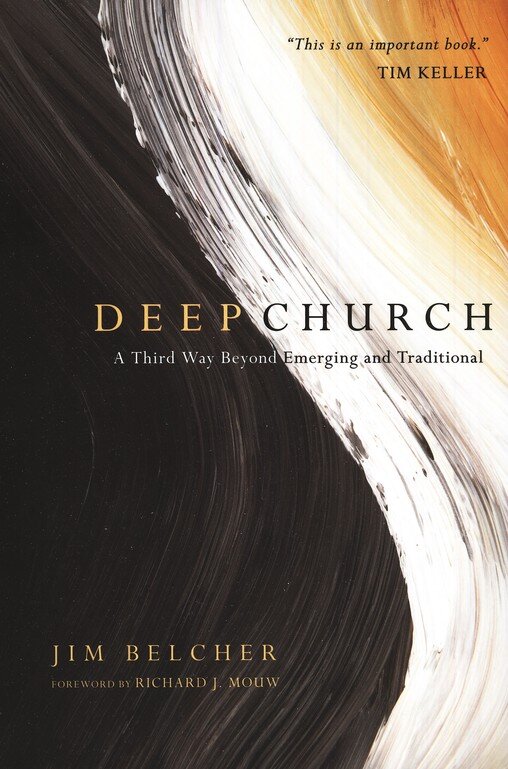Jim Belcher, Deep Church: A Third Way Beyond Emerging and Traditional. IVP Books, 2009.
Referenced in:
- Missional Communities – Convergent with Conventional
- Theology of Mission, Proposals and Formulations – Convergent with Conventional
LifeandLeadership.com Summary
This is one of several volumes under the banner of the Convergent church. As the term suggests, it seeks to capture some of the better elements of the emergent church without sacrificing important distinctives of more traditional evangelical churches, thus “convergent.”
Next to other books in this genre, this and Liederbach and Reid, The Convergent Church, are very substantive and well-researched. They offer their solid proposals with academic level critique of both the emergent and traditional church, and then propose ministry models that include redemptive features of both approaches. Both Belcher and Liederbach/Reid are experienced scholar-practitioners. Similar volumes such as Driscoll/Breshears and Chester/Timmis, while certainly substantive, are written primarily out of the authors’ experiences.
Belcher’s approach is first to describe the development and motivation of the emergent movement, “their protest and their plan for change, highlighting seven areas in which they are dissatisfied with the traditional church.” (14) These seven are:
- Captivity to enlightenment rationalism
- A narrow view of salvation
- Belief before belonging
- Uncontexualized worship
- Ineffective preaching
- Weak ecclesiology
- Tribalism
He follows this with an examination of how their protest either “threatens or strengthens the unity of the church.” He specifically asks whether they have enough similarity with orthodoxy for unity to be achieved. He argues for a return to ancient creedal orthodoxy (e.g. Apostles’ Creed, Nicene Creed, Athanasian Creed) as a means of building unity.
Then in a section labeled “Protest, Reaction, and Deep Church,” Belcher takes up the seven major protests again, providing a balanced critique of each and proposing his “deep church” alternative, which attempts to avoid any extremes.
Throughout, Belcher reflects strong awareness and gracious appreciation of emergents (enough to earn the respect of emergent Tony Jones and missional Alan Hirsch) along with a keen grasp of biblical theology. Tim Keller says of his book, “Jim Belcher shows that we don’t have to choose between orthodox evangelical doctrine on the one hand, and cultural engagement, creativity and commitment to social justice on the other.” Scot McKnight calls it the best analysis of the emergent movement he has ever seen.
From the Publisher
Feel caught between the traditional church and the emerging church? Discover a third way: deep church.
C. S. Lewis used the phrase “deep church” to describe the body of believers committed to mere Christianity. Unfortunately church in our postmodern era has been marked by a certain shallowness. Emerging authors, fed up with contemporary pragmatism, have offered alternative visions for twenty-first-century Christianity. Traditionalist churches have reacted negatively, at times defensively.
Jim Belcher knows what it’s like to be part of both of these worlds. In the 1990s he was among the pioneers of what was then called Gen X ministry, hanging out with creative innovators like Rob Bell, Mark Oestreicher and Mark Driscoll. But he also has maintained ties to traditionalist circles, planting a church in the Presbyterian Church of America.
In Deep Church, Belcher brings the best insights of all sides to forge a third way between emerging and traditional. In a fair and evenhanded way, Belcher explores the proposals of such emerging church leaders as Tony Jones, Brian McLaren and Doug Pagitt. He offers measured appreciation and affirmation as well as balanced critique. Moving beyond reaction, Belcher provides constructive models from his own church planting experience and paints a picture of what this alternate, deep church looks like—a missional church committed to both tradition and culture, valuing innovation in worship, arts and community but also creeds and confessions.
If you’ve felt stuck between two extremes, you can find a home here. Plumb the depths of Christianity in a way that neither rejects our postmodern context nor capitulates to it. Instead of veering to the left or the right, go between the extremes—and go deep.
About the Author
Jim Belcher (M.Div., Fuller, Ph.D., Georgetown) is the founding church planter and lead pastor of Redeemer Presbyterian Church in Newport Beach, California. He previously led the Twenty Something Fellowship and cofounded The Warehouse Service at Lake Avenue Church in Pasadena, California. He has served as an adjunct professor at Azusa Pacific University and was cofounder of the Renaissance Project Skateboard Company. He has been published in Regeneration Quarterly, and he lives with his wife and four children ln Costa Mesa, California.
***For additional information on this resource, including reviews, click the bookstore links. Check the reference at page top or the links below for resource guides on related topics.***
See Resource Guides on Related Areas:
- Missional Perspectives, Introduction
- Missional Church Resources, Introduction and Index
- Church Leadership and Renewal, Index to Resources
See Resources on Over 100 Areas of Ministry Leadership:


